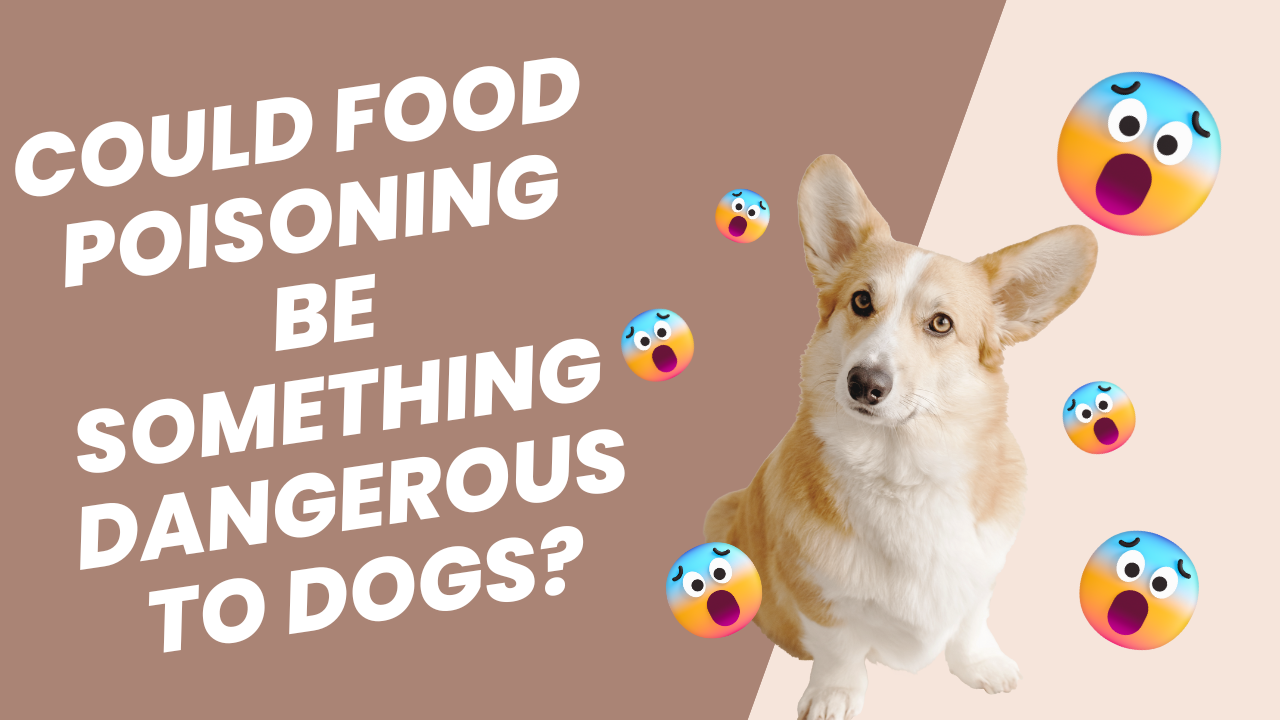Anyone who has ever had food poisoning knows how awful it feels. It’s so common for us humans that it has happened to all of us at least once. It was such an unpleasant experience that you still remember the last time it occurred. You might not even want to eat the food that caused it ever again! 🤢
It usually happens when we ingest food spoiled with a virus, bacteria or parasites, which then make us very sick. 🤮
Now if you turn around and look at your beloved four-legged friend staring at you as you’re reading this article, you may recall a time when he was particularly sick and had similar symptoms to the ones you’ve had. But does that mean he was also experiencing food poisoning?

How does a dog get food poisoning?
Peluche has a very tight relationship with the garbage bin. So tight that he LOVES going through it to find the rare forbidden treat that we denied him in the first place. Scavenging for leftovers is something that a lot of our furry friends do. It can lead to some unpleasant results, both for the scooper and the pooper. 😅
So what can trigger food poisoning in dogs?
- Compost and trash 🗑
Even if our dogs associate garbage with going to the 5 ⭐️ restaurant in the neighbourhood, plenty of items present a potential risk for them. Just like us, they’re not immune to mouldy or rotten foods. Compost falls in the same category as it contains many mouldy items that could trigger severe illnesses in your dog.
- Dead animals ☠️
Roadkill, dead animals found in the forest… All of those should be avoided at all costs. They carry plenty of parasites and/or bacteria that cause stomach aches and could even lead to very critical situations.
- Poop 💩
Eating faecal matter can cause your dog to have an upset tummy. Don’t give him the opportunity! Scoop that poop right away.
- Raw or Undercooked Food 🥩
Just like with any raw diet, if the components are not handled properly and treated accordingly, they can potentially create food poisoning for our dogs. This is one of the many reasons we feed our dogs fresh, slow-cooked food.
My dog has emptied the trash bag in my absence – what now?
Well, if your dog has decided to pay a visit to his favourite joint in your absence, there’s a chance that one or more of the following symptoms will be displayed:
- Vomiting
- Diarrhea
- Decreased appetite
- Sluggishness
- Dehydration
In some instances, they might even seem disoriented or, in the worst cases, have seizures which might lead to your dog collapsing.
Each stomach is different; depending on how resistant your dog is to certain elements, it may manifest itself in various intensities and severity. Like for us, vomiting and diarrhoea are the first symptoms your dog will display in case of food poisoning.
What to do when your dog starts vomiting
Offer your dog some water to make sure he stays hydrated. 💦
Any food should be excluded for the next few hours. This way, you don’t make matters worse by letting him have even more food and thus feel worse.
If vomiting keeps on happening during those hours or the next day, you should get in touch with your vet.
If your dog starts throwing up bile or water and seems disoriented and uncoordinated in his movements, take him to your vet right away‼️
A lot of pain and trouble can be avoided if you act quickly.
Good to know: the difference between food poisoning and food toxicity!
Food toxicity gets triggered by ingesting certain foods such as garlic, onions, tomatoes, chocolate, … 🍫 It displays symptoms that are often very similar to food poisoning.
The difference is that food toxicity is linked to a component (in its natural and unspoiled state) that’s toxic to your dog when given at all or in too significant quantities.
Food poisoning doesn’t sit quite well in your dog’s tummy due to the decay or rottenness of the ingurgitated items. 🥴
What can I do to prevent food poisoning?
The following tips are valid for both food toxicity and food poisoning as they revolve around ensuring your dog’s environment is safe. Always pay attention to what’s lying around the house, the garden and your pet’s favourite walking path!
- Avoid any table scraps 🙅🏼♀️ as they contain elements that are harmless for us but can cause food toxicity and food poisoning to our furry friends.
- Put the trash away in a spot where you’re confident your dog won’t have easy access.
- Regularly ensure no dead critters 🐿 lying around your garden or on your usual walking paths. Your dog might be quick on gobbling them, and then you’re in for a few hours of worry to see if he will digest his golden snack or not…
Respecting these guidelines and being conscious of what your dog has access to regarding scraps and food will alleviate stress and pain for both him and you! 😊

